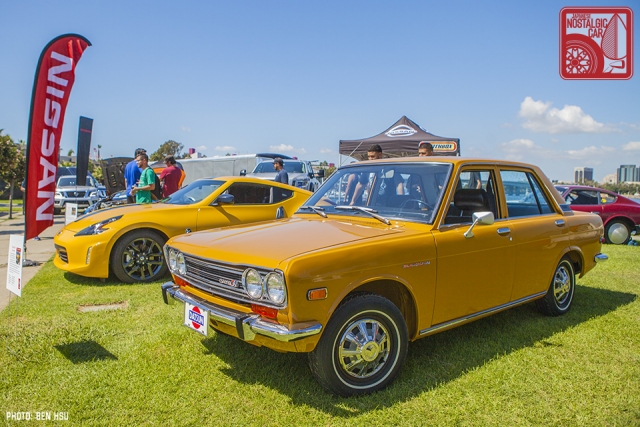A friend recently called to ask for car buying advice. He commutes 60 miles each way to work and the fuel bill’s adding up. He is a car guy and owns a stable of fun cars, but they’re all either too precious or too thirsty to daily. He fills up twice a week on premium right now. He’s considering a 2012 RAV4 EV for around $5,000, thinking he’d make the cost back in fueI savings in about a year. He only has access to an EV charger at his workplace, not at home. I had suggested a kei car, but his commute has no traffic and he was worried about sustaining 75 mph in one. Also, the roads aren’t great so a low car isn’t ideal.
How can we save my friend from buying a 12-year-old EV?
The most entertaining comment by next week will receive a prize. Scroll down to see the winner of last week’s QotW, “What LHD car would you drive in Japan?“.
This was kind of a weird question, which elicited some weird answers! Understandable, many chose to go with American or European cars not commonly available in Japan. A Yank tank like MikeRL411‘s ’55 Bel-Air, Sedanlover‘s pink Cadillac or StreetSpirit‘s Grand National would definitely have locals saying, “They not like us.”
European cars tend to fit better in Japan, as both regions have narrow roads and aren’t as allergic to smaller cars, wagons, and hatchbacks. Genda Nicolai Yturzaeta Iwakawa: made an impressive list of just about every non-exotic European car on Earth. Taylor C. went with cars much appreciated by the Japanese already, like an E36 M car or Volvo 850 wagon. Fred Langille‘s personal Mercedes CLA in yellow would fit in quite well there too, despite the loud color.
We got some particularly interesting answers in the form of Japanese cars that were not available in Japan. Yewnos100‘s Euro-spec 323F or Accord Aerodeck were excellent choices, as was Raul‘s Suzuki Jimny 5-door. Franxou‘s second-gen F0rd Probe is a great take on reskinned and rebadged car on Mazda mechanicals. In the same vein, Jidoshaojisan‘s nearly won with his Plymouth Laser RS pick, a ChryCo-branded car with Mitsubishi underpinnings.
The winner this week was Mike B. H., whose passion we felt in every word of his answer. It wasn’t about being different, but about devotion to his own beloved car, and that touched us deeply.
Oh, to drive my LHD ’71 Datsun 510 SSS sedan in Japan…
While visiting Tokyo/Kyoto/Hiroshima I was awestruck by how their streets were so clean, well-cared-for, and in some cases, awkward (in a fun way).
The sensory experience of driving any vintage car is very cool. But the image of driving my 510 at night in Tokyo with windows down, pulling in the visual, auditory (and olfactory) sensations of Tokyo nightlife – is to me the essence of alluring and serene.
It would be a privilege to bring my Datsun back to it’s land of manufacture where it would feel right at home navigating the narrow but pebbly-smooth surfaces of Tokyo roads/side streets.
Omedetou, your comment has earned you a set of decals from the JNC Shop!









Answer: you don’t.
This sort of early EV needs people with these sort of predictable use case scenarios to save them from the scrapheap.
Lots of this stuff like 1st gen Nissan Leaf, Mitsubishi i-Miev etc.(or here in Europe, cars like Renault Fuence ZE and Kangoo ZE) or earlier stuff are largely unwanted as longer range EVs get very affordable so could dissapear quite rapidly. Some do get upgraded with newer battery packs, but not all.
Todays unwanted clunker is tormorrows JNC.
At WOT, the speedo needle on my father’s 1-liter 3-cylinder 5-speed Geo Metro would sit right at 90 mph. Fast enough?
Oof, i’ve been through a similar situation with one of my best friends, he used to be so young, so healthy and so full of life, i remember after school afternoons as teens playing Grand Turismo on the PS2 i got from the thrift store, when i chose Mitsubishi he’d go Subaru, for every Skyline he countered me a Supra etc.
we’d race and race and race…now a good ten years after and things changed.
I’ve got my speedshop and every day feels like a game of grand turismo whereas he took a more corporate path, no longer does he desire blasting downhill on el capitan in a nissan march super turbo, no more supras on trial mountain…
He got himself a very dependable grey volkswagen jetta and all I hear about is the MPG, infotainment and heated seats for his lower back pain.
I was too late to save my buddy but maybe if you bombard him with videos of touring cars from the 90’s a manual gearbox civic, corolla or something mazda might have a spot in his future?
Honda Fit. I bought a 2015 Honda Fit EX 6-spd manual (in yellow) with 130K miles for $10K. The only thing I had to replace was the chain tensioner which was noisy at startup. Simple job that took an hour. I get 32-35 mpg at 75 MPH+ or 40+ mpg when I purposely hyper-mile it. I have a 74 mile roundtrip commute so it works out to about one tank fill per week of regular. It is certainly not a fast car but I enjoy revving the snot out of it to get the most of its chipmunk torque.
The EV would fit his commuting needs. There are EV lease deals out there. I am not sure if the newer ones charge up faster of if that matters but I remember a time last year when Ioniq 5’s and Ioniq 6’s could be leased cheap under $200. They would certainly be more interestig to drive than a Rav 4. Do they still have Nissan Leaf lease deals? Some deals are EV incentive-driven. Modern tech for the current EV infrastructure might be a benefit.
How long does a typical EV battery last? This isn’t a hybrid electric vehicle, and once that battery is depleted, you’re hosed. $5000 down the drain, unless he wants to cough up for a new battery. Even then, RAV4 EV batteries might no longer be available either. Also, when I was looking at Priuses for my wife, one thing I took notice was the “battery life remaining,” and that really made me think twice about any hybrid electric car I was looking. A battery life of 80%? Definitely made me nervous.
If he’s a car guy, why not buy an older Altima or Accord or Camry or Fusion with a stick shift? I’m sure he’ll appreciate flooring it and rowing his own gears onto the freeway, and knowing that the commuter can / will take a beating and still return 30+MPG. Mid-sized sedans have always been the norm back in the day, and I can’t see why these four-doors would struggle on his route. When my TDI station wagon was totaled, I needed a replacement for it; one that would serve as family car, 60-mile commuter, and be fun and reliable. I ultimately bought my Mazda 6 with a stick. It does fine in the pot-holed Boston Metro roads, emits a nice growl when I get onto it on the onramp, cruises well on family road trips, and returns 32+MPG average on 87 octane.
Sometimes I come across car enthusiasts who have a nice collection of “summer cars,” and they go on the complete opposite end for their beater car, like a Dodge Stratus, or a CVT’d car. It’s interesting to see the spectrum, but it’s not something I think I can do myself. I’d still like my commuter to be somewhat engaging, and I think your friend should realize that too.
It’s usually pretty easy to assess battery health, but battery life depends on the number of full charge/discharge cycles so if you don’t run the battery down every day, it can last surprisingly long. Hybrids and PHEVs often go through their batteries faster than a pure EV as they tend to use their entire battery every day.
The battery will generally also degrade over time rather than completely fail in one go.
Battery packs can be reconditioned on an exchange basis too so you’re not neccesarily shelling out for a new one, or on an older EV, it can be an opportunity to vastly upgrade the capacity which is what people are already doing with early Nissan Leafs.
The described use case screams for an EV, just don’t buy an old one!
There sadly are not many ways to keep old EVs on the road. There are not much there to break in the first place so they are reliable, but the battery is the main thing to go wrong. There are less and less of these old batteries to fetch for a given car, and they all have the same age.
I have a second-gen Leaf and I am already having this problem. At least it is under warranty, but Nissan is producing batteries for new car sales, not warranty work, so the wait is long. When the car will not be in production anymore, do you think they will keep manufacturing Leaf batteries? Heck no! Eventually there will be a cottage industry making batteries for old EVs like there is for most car parts, but it is not yet a reality. At least Tesla uses common cells, but Nissan is all bespoke. No idea how Toyota does it.
Right now, the best EV you can get is a leased EV. They are the future, I have no doubt about this, and even my lowly Leaf is a blast to drive. But we had a hundred years to put a gas station and a repair shop on every busy street corner and highway exit, we just do not have this yet for EVs. Leases can be very cheap, especially when you consider saving hundreds of dollars on gas every month, while charging at home costs peanuts. Having to use other chargers can mean a paying for the service so it is to consider before commiting to this.
In my area, I noticed that two-years leases are often cheaper than 3- ans 4-years leases, so… Why keep a car for 4 years when for cheaper you can have one every two years? I bought mine thinking it will be as reliable as my old folks’ one, but I unluckily got a bad one. Depending on family needs and my significant other wants, it looks like we will go for an older luxury japanese car, a leased EV or a minivan.
Bonus fact, every EV you see is saving gas for us to drive our nostalgic cars!
I agree with the others that actually, a used EV for this need is actually a great idea and should probably be encouraged.
If he’s honestly wanting just to lower the gas bill, then first of all, he needs to stop with the premium. We need a car that’ll run on the distilled mud that is Regular. A Fit’s nice if you can find it, as is any other of the economy end of things (Corollas, Yari, etc). But really, if he’s concerned that it needs to handle lousy roads, then might I suggest (if one can be found), a Toyota Paseo? I was originally going to suggest a Tercel as the hypermiling cockroach champion, but then I remembered it came as in a more charismatic coupe form and so here we are. It’s even available as a convertible!!!
I cannot think of anything that’d really fit the bill as a cheap as chips EV alternative, and it even counts as a JNC.
What are the Honda CR-Z going for these days? Seems like he’s the exact case for this type of vehicle, A small commuter that’s comfy, where they turned economy into a game and tried to keep it fun.
A basic non-turbo gasoline engine car from Toyota or Honda with a manual transmission. I’m still driving my 2005 Corolla CE with manual which I bought new for $14K. Car now has 140K miles on it and mechanics have told me they’ve seen this gen. corolla still driving with 300K miles on it. Maintenance so far has been 2 batteries (original got stollen), front and rear brake pads/shoes, new radiator, new water pump, new thermostat, front auxiliary belts, gas cap, new air/cabin filter, and oil/filter change at 4K miles. My corolla gets 40 mpg (highway). I dive the car like a grandma because it’s my daily driver. If I’m going on a long trip, I rent a car. I don’t think there’s an EV that’s cheaper to own for 20+ years of use.
A new car I would get is a base 2024 Honda Civic Sport with a manual transmission that has MSRP of $26K. There shouldn’t be much to go wrong with it since it seems pretty basic.
Outside North America, primarily in other countries overseas – like the rest of Europe, Australia, New Zealand and to a lesser extent Japan, Malaysia and Thailand, rather than recommending an EV to own, then it maybe better off to own a cars from non-Japanese car manufacturers like the Stellantis of today (Peugeot, Fiat and Jeep mainly Renegade and Compass to the third one and also half of Stellantis’ products use Nissan radiators hence Calsonic), Renault – owner of Nissan, Volvo – most of its cars uses Toyota’s automatic transmissions, among others.
While Stellantis had Nissan connections even before the former established just as both also have had connections with Renault, hence the PRV V6 and Douvrin engines, therefore with the rest of Stellantis and Renault Nissan Mitsubishi’s lineup already go electric or hybrid, I think second-hand diesel-powered Peugeots and Renaults of the same era (mainly 2016 when Britain voted to leave the European Union in the same year Nissan acquired Mitsubishi) like Renault’s Captur (sharing the same specifications with the Nissan Juke and March/Micra) and the Peugeot 2008 (the diesel of that is also used in the Toyota ProAce exclusive to Europe) might be a better choice over an electric vehicle since diesel-powered cars are useful for hauling since pickups with long(er) noses aren’t even a norm in both European and Japanese roads…